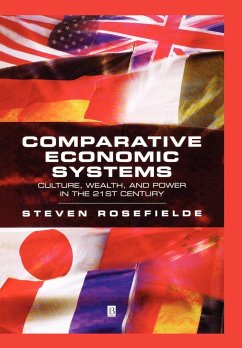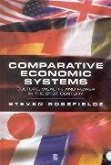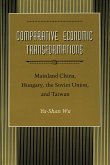Comparative Economic Systems: Culture, Wealth, and Power in the 21st Century explains how culture, in various guises, modifies the standard rules of economic engagement, creating systems that differ markedly from those predicted by the theory of general market competition. This analysis is grounded in established principles, but also assumes that individual utility seeking may be culturally determined, that political goals may take precedence over public well-being, and that business misconduct may be socially detrimental. The book clarifies conceptual misunderstandings about the comparative merit of free competition and perfect governance, showing in many cases how the same results are attainable using either mechanism, or by combining them. It illuminates why engineering variables such as the quantity and quality of fixed and variable inputs, management, entrepreneurship, technological progress, and economic governance do not adequately explain disorders like the increasing poverty of the world's poorest nations. End-of-chapter questions and an extensive glossary enhance the book's utility and enable readers to fully comprehend the key features of each chapter.
Hinweis: Dieser Artikel kann nur an eine deutsche Lieferadresse ausgeliefert werden.
Hinweis: Dieser Artikel kann nur an eine deutsche Lieferadresse ausgeliefert werden.
"Now that the transition is over, Professor Steven Rosefielde isbringing back a new and improved version of comparative economicsystems, one that treats culture, politics, and business misconductexplicitly in a market context. Rosefielde's approach is originaland sophisticated, producing a theoretically rigorous text stillaccessible to the advanced undergraduate student. Students willlearn a large amount of economic theory and come to appreciate thevariety of economic systems and the sources of that variety. Thisis a signal accomplishment by a serious scholar and student ofcomparative economics." James Millar, George WashingtonUniversity
"This book is an outstanding text to acquaint students with thedifferences among the world's major economic systems. Its author isone of the best-informed and most careful scholars in the field."Quinn Mills, Harvard Business School
"Thisis an ambitious and innovative work that rigorously andsuccessfully addresses a question that economists often andmistakenly ignore: namely, how do ethics, culture, and politicsaffect the operation of core economic principles and the relativeperformance of the major economic systems in the globaleconomy?"Charles Wolf, RAND
"Rosefielde provides a forward-looking text that is firmlygrounded in the fundamentals of comparative economics but thatseizes fully the opportunities offered to the field by the end ofthe cold war. This is a text that can make comparative economicsystems a "must-take" course for every undergraduate and a"must-offer" course for every economics department." Josef C.Brada, Arizona State University
"This book is an outstanding text to acquaint students with thedifferences among the world's major economic systems. Its author isone of the best-informed and most careful scholars in the field."Quinn Mills, Harvard Business School
"Thisis an ambitious and innovative work that rigorously andsuccessfully addresses a question that economists often andmistakenly ignore: namely, how do ethics, culture, and politicsaffect the operation of core economic principles and the relativeperformance of the major economic systems in the globaleconomy?"Charles Wolf, RAND
"Rosefielde provides a forward-looking text that is firmlygrounded in the fundamentals of comparative economics but thatseizes fully the opportunities offered to the field by the end ofthe cold war. This is a text that can make comparative economicsystems a "must-take" course for every undergraduate and a"must-offer" course for every economics department." Josef C.Brada, Arizona State University








